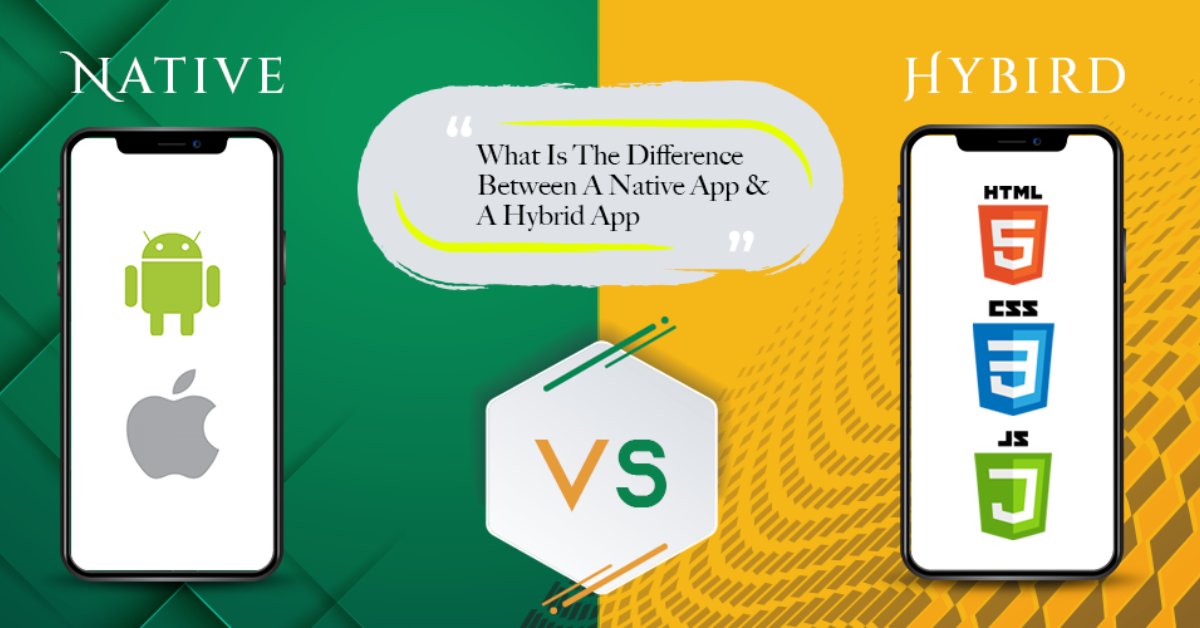Difference Between Native App & Hybrid App
Native App & Hybrid App What Is The Difference Between Them? Read The Blog To Find Out Which One Is The Best Mobile Application.

What Is The Difference Between A Native App & Hybrid App
Whenever the company decides to make a mobile application, they choose between a native app and a hybrid app. In this blog, we will be sharing the difference between the native app and the hybrid app. Also, their pros and cons will be discussed.
2022 was the year of mobile application developers. For the past decades or so, mobile applications have quickly expanded in popularity and just about every person in the world uses apps via their mobile devices. This is something small and large business owners can absolutely take advantage of. For online businesses or different service providers, creating a mobile app is a big advantage.
One should definitely consider developing a mobile app. A mobile app developer can help you clear your goals and help you understand the best options according to the time, cost and technical consultants and help you build a world-class mobile app for your business. As mobile app development services are aimed at building Android and iOS applications effectively.
If anyone is seeking a higher-level overview and understanding of the difference between hybrid and Native applications, then this blog is for them. The difference usually depends on a variety of factors, including how your users want to use and operate the app.
A Native app is built for a specific and separate operating system either Android or iOS. On the other hand, Hybrid apps are built to work across any platform or operating system.
Developing a native app is more costly, you will plan to look beyond the expense tag and think about the type of functionality you need for your mobile app. Both apps are good terms for different reasons but are not for the same reasons.
Each has its own advantages and disadvantages which will define whether a native app or a hybrid app is better. Both hybrid and native apps are allowed to be distributed through the official marketplace like google play and the app store.
What Is Native Application
The native apps are created from a particular platform either iOS or Android. That is to say, native applications are built on different programming languages which can be supported only by a certain platform like Objective-C, Swift for ios and Java, and Kotlin for Android.
Native apps are specifically built for only one platform. The mobile apps are based on different programming languages that support only one specific platform at a time. The languages are usually Kotlin or Java for Android app development and Objective-C or Swift for iOS app development.
Native mobile apps cannot run on another mobile operating system since they are developed for another platform. For example, a mobile app built for the Android mobile operating system can't run on iOS devices and vice versa. Turn your online store into a native mobile app without hiring an iOS or Android developer using AALogics Magento 2 Mobile App Builder.
Native apps, as the name tells, that developed app only runs natively on a device. One of the most important benefits of a native app is that since the mobile apps are specifically built for one mobile operating system i.e.Android, iOS or Windows, the mobile apps can use the full functionality of the required mobile devices. It can make the mobile app run smoothly with fewer errors.
What is Hybrid Application
Hybrid apps work with multiple platforms using mostly web technologies. A hybrid mobile app is built on a web view which runs on a web application with a native browser. These can be viewed on android and ios from web view and uiwebview respectively. The hybrid app development process depends on cross-platform functions. The developers can use several web technologies and hybrid app development languages such as CSS, HTML, and JavaScript frameworks.
Hybrid apps are generally easier and a lot faster than native apps to develop. The Hybrid apps also require less maintenance. Whereas when it comes to the speed of your hybrid app it will totally depend on the speed of the user's browser. This means that the native app runs faster as compared to the hybrid apps.
A wide range of mobile application varieties are now available. Many people use Android apps, iOS apps, Native development, Cross-platform apps, Hybrid apps, and Progressive Web Apps for their personal and business purposes. Now it is clear what hybrid apps and native apps are, now let’s see their advantages and disadvantages.
Advantages Of Native Apps
- Native apps are faster and run smoothly since they are developed from one mobile operating system.
- Mobile apps are the best in performance.
- The user input and output, for the mobile apps, are much smoother.
- Most of the apps provide offline mode.
- There is full access to the functionality of the app and their devices.
- The overall performance of the user experience is great as the user interface is specifically for the platforms.
Disadvantages Of Native Apps
- The native mobile app development cost is very high.
- The time is slow for mobile app development.
- Since the programming languages are complicated, you will need expert development companies.
- For simple apps, the native app is not a good choice.
Advantages Of Hybrid Apps
- In very less time a hybrid app can be developed.
- For hybrid apps, the cost of development is lower.
- A hybrid app can run on multiple operating systems and platforms.
- For multiple platforms, the app development needs to be done only once.
- Hybrid apps allow access to the device’s APIs.
- For these apps maintenance and support are easy.
Disadvantages Of Hybrid Apps
- Compared to native app development hybrid app development is a much slower process.
- The full functionality of mobile devices by hybrid mobile apps cannot be used.
- Hybrid apps fail to be interactive and intuitive as compared to native apps.
- The native apps are much better than the hybrid app in terms of providing a Google user experience.
- The hybrid app required a network every time it ran.
- Hybrid apps are dependent on a 3rd party wrapper.
Conclusion
While doing mobile app development for your business one should take into consideration the advantages and disadvantages of every type of mobile application. As can be seen, the most common difference between the hybrid app and the native app is their development method. It is affected by all the related factors like cost, time, effort, etc.
Every year millions and billions of mobile apps are developed. Usually, each mobile app has its own pros and cons. It is up to the specific owner of the business, organisation and end-users to decide which type of application is good for them. For far better results, it is best to discuss mobile application development with an expert and choose the best mobile app development packages.
It would be easy for professional mobile app developers to identify your requirements and provide the best ideas and solutions in the best possible way. Both Native and Hybrid apps have their own pros and cons. In the end, it is up to the user and owner of the mobile app which app should he or she develop native or hybrid.












